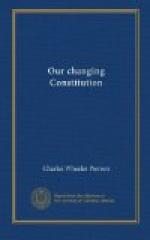[Footnote 2: Revenue Act of 1918, Title XII.]
The assumption by the National Government of jurisdiction over the manufacture and sale of intoxicating liquors is no more of an encroachment on the prerogatives of the states than is its assumption of jurisdiction over child labor and the use of narcotic drugs. We come back, therefore, to the proposition that the Prohibition Amendment is to be regarded less as a departure in American fundamental law than as a spectacular manifestation of a change already well under way.
The change, however much students of our institutions may deplore it, is not difficult to explain. The earlier solicitude for state rights was in a sense accidental. It was based on sentiment and mutual jealousies among the colonies rather than on any fundamental differences in race, beliefs, or material interests. The traditions behind it, while strong, were of comparatively recent growth. When they entered the Union the colonies were still new and undeveloped. As men died and their sons succeeded them prejudices gradually yielded and sentiment changed. Moreover, various other forces—immigration, free trade among the states, the growth of railways and other nationwide industries, foreign wars—have been at work to obliterate state lines.
Advocates of the old order see in the change a breaking down of the principle of local self-government. To their minds the danger of majority tyranny, made possible by a centralization of power in a republic of such vast extent and varied interests, outweighs all the advantages of national uniformity and efficiency. Advocates of the new order think otherwise. They argue, moreover, that the states have become too great and populous to serve as units for purposes of home rule; that their boundaries are for the most part artificial and correspond to no real distinctions in the ordinary life of men. They assert that the instinct for local self-government remains as strong as it ever was, and instance the resentment of New York City over interference from Albany.
The average man gives little thought to the constitutional aspect of the controversy. His interest in the prohibition movement is focused on other features which seem to him of more immediate concern. And yet, did he but realize it, the constitutional aspect transcends all the others in its importance for the future welfare and happiness of himself, his children, and his country.
V
THE NINETEENTH AMENDMENT
A prudent man touches the question of woman suffrage gingerly. Many fingers have been burnt in that fire and its embers are not yet dead. Some mention of the Nineteenth Amendment seems necessary, however, in any discussion of federal encroachment on state power, and it may be possible to approach the suffrage movement from the standpoint of constitutional law without getting upon controversial ground.




